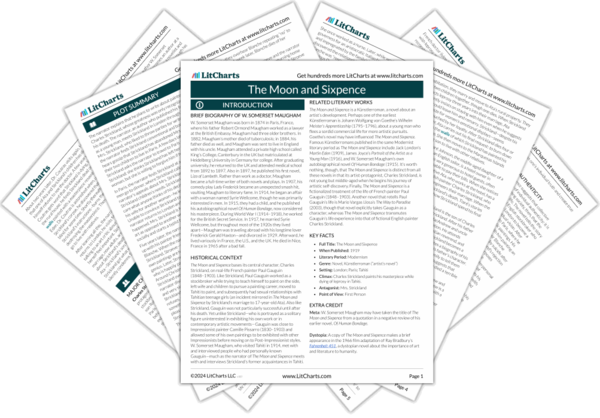The Moon and Sixpence suggests that collective society is the enemy of individual authenticity: it is only by defying or fleeing society, then, that the individual can live a truly authentic life. The novel tells the story of Charles Strickland, a conventional English stockbroker who abandons his inauthentic family life in London to become a painter and express his authentic, individual vision. After abandoning his family, Strickland moves to Paris, where he begins to produce strange and idiosyncratic paintings. His quasi-apprenticeship in Paris culminates with him painting an impressive—but not perfect—nude of his lover Blanche Stroeve, the wife of an acquaintance who dies by suicide after Strickland decides he is “done” with her. Strickland’s rejection of his lover Blanche after using her for artistic purposes constitutes another abandonment of “society,” here represented by another woman who would make interpersonal claims on him, and thus an ascension to another level of authenticity in his painting. After Paris, Strickland makes his way to Tahiti, where he retreats to a reclusive rural area with his new teenaged wife Ata. It is in rural Tahiti that Strickland makes his greatest paintings and realizes his authentic individual vision, a realization that the novel implies is due to his living in a “primeval” environment surrounded solely by people of color, whom the novel represents—in a problematic, racist fashion—as less civilized and thus more authentic than Strickland’s former European acquaintances. Thus, the novel ties Strickland’s increasing rejection of “society” to his increasing authenticity both in his interpersonal life and in his art.
Society vs. Authenticity ThemeTracker

Society vs. Authenticity Quotes in The Moon and Sixpence
I do not speak of that greatness which is achieved by the fortunate politician or the successful soldier; that is a quality which belongs to the place he occupies rather than to the man; and a change of circumstances reduces it to very discreet proportions. […] The greatness of Charles Strickland was authentic.
The moral I draw is that the writer should seek his reward in the pleasure of his work and in release from the burden of his thoughts; and, indifferent to aught else, care nothing for praise or censure, failure or success.
It was obvious that he had no social gifts, but these a man can do without; he had no eccentricity even, to take him out of the common run; he was just a good, dull, honest, plain man. One would admire his excellent qualities, but avoid his company. He was null. He was probably a worthy member of society, a good husband and father, an honest broker; but there was no reason to waste one’s time over him.
Her black dress, simple to austerity, suggested her bereaved condition, and I was innocently astonished that notwithstanding a real emotion she was able to dress the part she had to play according to her notions of seemliness.
It chilled me a little that Mrs Strickland should be concerned with gossip, for I did not know then how great a part is played in women’s life by the opinions of others. It throws a shadow of insincerity over their most deeply felt emotions.
Strickland was not a fluent talker. He seemed to express himself with difficulty, as though words were not the medium with which his mind worked; and you had to guess the intentions of his soul by hackneyed phrases, slang, and vague, unfinished gestures.
I take it that conscience is the guardian in the individual of the rules which the community has evolved for its own preservation. It is the policeman in all our hearts, set there to watch that we do not break its laws. It is the spy seated in the central stronghold of the ego.
It was all false, insincere, shoddy; and yet no one was more honest, sincere, and frank than Dirk Stroeve. Who could resolve the contradiction?
“Sometimes I’ve thought of an island lost in a boundless sea, where I could live in some hidden valley, among strange trees, in silence. There I think I could find what I want.”
He did not express himself quite like this. He used gestures instead of adjectives, and he halted. I have put into my own words what I think he wanted to say.
It may be that in rogues the writer gratifies instincts deep-rooted in him, which the manners and customs of a civilized world have forced back to the mysterious recesses of the subconscious. In giving to the character of his invention flesh and bones he is giving life to that part of himself which finds no other means of expression. His satisfaction is a sense of liberation.
“But he was blind.”
“Yes; he had been blind for nearly a year.”
“I think Strickland knew it was a masterpiece. He had achieved what he wanted. His life was complete. He had made a world and saw that it was good. Then, in pride and contempt, he destroyed it.”
My Uncle Henry, for twenty-seven years Vicar of Whitstable, was on these occasions in the habit of saying that the devil could always quote scripture to his purpose.













